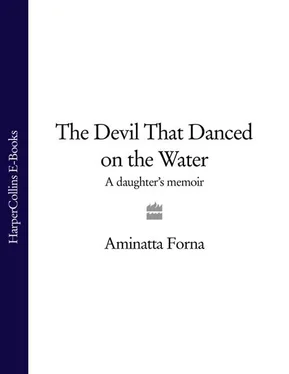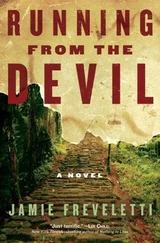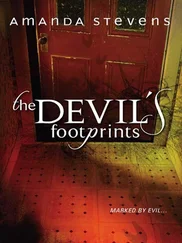I lay there listening to the ordinary sounds. I hadn’t fallen asleep and been put to bed for years. Had I somehow imagined all of it? I wriggled free of my sheets and yanked up the mosquito net. Pulling it over my head, I leaned out, balancing myself with both hands on the floor. I ducked my head under the bed and slid out my vet’s box. The tiny bottle of Dettol was still inside, the top was on. Everything else was in place. I was about to close the lid and push the box back, when I paused and instead I removed the bottle to inspect it. It was my bottle, that was certain, and someone had returned it to the box. But there were no more than a few drops of liquid left inside. And the label was spoiled. It was bloodstained and covered in reddish-brown fingerprints so that you couldn’t even read the words any more.
At breakfast our father tells us the man had a car accident. He is wearing a brown suit, ready for the office. I am eating Weetabix, soaking them in milk and mashing the biscuits up. At the weekends my stepmother supervises in the kitchen and we have akara , deep-fried balls of banana, rice flour and nutmeg; or else fried plantains with a hot peppery sauce made with fish and black-eyed beans. On weekdays we eat cereal and toast.
‘How did he crash?’ we ask. I layer sugar thickly over the cereal.
‘I don’t know,’ our father replies.
‘What happened to him?’
‘He’s gone to a hospital.’
We nod. I spoon the soft brown mush into my mouth while I begin to formulate another question, but my father’s next statement stops me dead in my tracks.
‘Am, I’m seeing someone today. A maths tutor. I want you to have some extra lessons during the holidays.’
My mouth is full of Weetabix and I am left speechless. It’s true that my maths is not good. I routinely come midway down my class, unacceptable by my father’s standards. Every term he hands out awards for first, second and third place but I rarely manage to make the grade. At the last minute he comes up with a booby prize ‘for effort’ which somehow always has my name on it. But the holidays have only just begun; we arrived home from our boarding schools in England ten days ago. I cannot decide whether I am affronted or pleased to be singled out for such attention, to have my own maths tutor. While I am considering all this my father finishes his breakfast and borrows my milk glass. He pours himself a glass from one of the bottles of boiled water we keep in the fridge. As the glass fills the water turns cloudy. It doesn’t look very appealing.
‘Ugh!’ I say.
‘It all goes to the same place.’ My father smiles, amuses us by draining the whole glass with exaggerated delectation. He kisses us and he is gone.
In the afternoon the rain begins. The ground around the house fills up with rust-coloured puddles. Little rivulets of blood join into ever larger tributaries which weave down the slopes to the slaughterhouse stream. The heat doesn’t abate and the smell of steaming dirt is like a wet dog. The drops hurtle onto the corrugated roof of the garage, bouncing obliquely on the curves of tin and crashing like a thousand demented timpanists. Through their discordant rhythm rises the regular beat of the man with the pickaxe, who keeps on splitting stones. He has stripped down to a pair of torn shorts and the water washes away the sweat and shimmers on his torso. The man doesn’t pause once. On his right a second mound of small stones has begun to overtake the original pile of rocks.
On the balcony, below the curled iron railings, pools of water form and stretch out over the tiles. I take my book and sit in one of the long line of chairs. I am alone. No one comes to the house today. Ordinarily, by mid-afternoon the people have begun to arrive alone and in pairs, usually on foot from Kissy Bye-Pass Road, more rarely by taxi. Anyone known to the family goes through the house and keeps company on the back veranda. The others sit out front on the roadside. They come from Freetown and from the provinces in need of help.
The chairs are strung with green and yellow plastic cord which is no longer taut and cuts into the flesh. The people sit uncomplaining on the uncomfortable chairs, nursing their requests until my father comes home from work. If he is late or busy, they come back the next day. Some of them are his former patients wanting further treatment but without money to pay another doctor; others bring news of a death or need help to school a child. Sometimes he is asked to intercede in a family dispute or help find someone a job. Most of them just want a little money.
When they start to arrive I usually disappear somewhere else. Once a blind man climbed up the stairs from the road and accidentally sat on top of me. In school we were taught that blind people had super sensory powers and hearing like a bat’s radar; we were warned never to treat them as though they’re helpless. So I watched as the blind man lowered his bottom, believing, until it was too late, that he must somehow know I was underneath him, my tongue locked with the shame of the moment. As soon as his buttocks touched me the blind man shot up in the air like a jack-in-the-box and groped his way silently into another seat. The blind man isn’t here today. There are no visitors at all. Perhaps it is the rain that is keeping them away.
After an hour or so I wander through the house. Inside all are preoccupied with their own business. Santigi is at the back of the house sorting the laundry. Morlai is in the room they both share off the kitchen. I expect he is studying. Santigi wants to go to school too, but he’s already over thirty, though he fibs about his age and says he’s twenty-one. He was once sent to literacy classes but he struggled to learn to read and write. Still, on occasions he borrows my maths and English schoolbooks and works through the chapters alongside me. ‘I want to learn,’ he always says. A few months ago Santigi bought a Bible and changed his name. One day he stood before us all at supper and addressed our father directly with a deadpan face: ‘Doctor,’ he said, in Creole, ‘ah wan change me nam. Please, oona all for call me Simon Peter.’ He has remained resolute since: he withstands our teasing and corrects us every time we call him Santigi.
Santigi arrived at the same time as my stepmother four years before. No one knows who Santigi is, meaning that we don’t know his family or to whom he belongs. In a society built, layer upon infinite layer, on the rock of the extended family, Santigi can produce neither mother nor father, aunt nor uncle, sibling nor cousin. All he knows about himself is that he was born in a village called Gbendembu, near Makeni in the Northern Province. After giving birth his mother, who was without a husband, put herself to work digging diamonds in an illegal pit many miles away in Bujubu. She left her baby with neighbours and never returned to claim him. Much later news came that she had died. Once Santigi was of an age the couple who had taken care of him sent him to Magburaka to work for my stepmother’s family. He first met my stepmother Yabome off the train when she was a schoolgirl returning home for the holidays and he has been by her side ever since. Santigi often spends time with me, but not right now.
The rain and the day wear on. Sullay drops by at lunch time and stays at the back of the house whispering with Santigi and Morlai. Sullay has a deep, matt-black complexion, a strong jawbone and sharp eyes shaded beneath a rather brooding brow. His whole face is a study in intensity. He rarely smiles, but he is very kind. I stop by to say hello. Sullay doesn’t stay long.
Shortly before dusk the sound of the pickaxe stops. There are no more rocks to split. The man stands in his doorway out of the rain, dwarfed by the enormous pile of stones. He is listening and waiting for the truck to come back.
Читать дальше












